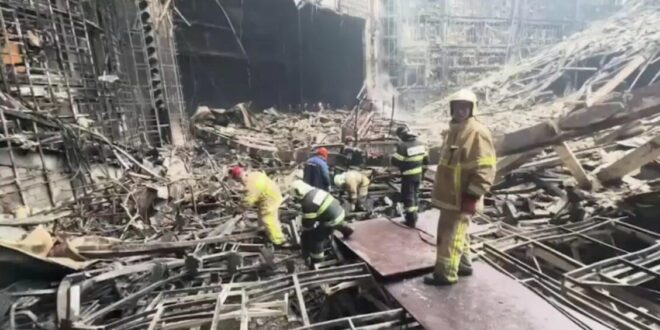What is ISIS-K?
ISIS-K, short for Islamic State Khorasan Province, is a regional affiliate of the larger Islamic State group.
The affiliate group operates primarily in the Afghanistan-Pakistan region, although it has presence throughout the historical “Khorasan” – a region that includes parts of the modern-day nations of Afghanistan, Pakistan and Iran, along with other Central Asian countries.
Established in 2015, ISIS-K aims to establish a physical “caliphate” – a system of governing a society under strict Islamic Sharia law and under religious leadership – in the South and Central Asian region.
ISIS-K’s beliefs follow the ideology of its parent organization, the Islamic State group, which promotes an extreme interpretation of Islam and sees secular government actors, as well as non-Muslim and Muslim minority civilian populations, as legitimate targets.
The group is known for its extreme brutality and for targeting both government institutions and civilians, including mosques, educational institutions and public spaces.
Following the U.S. withdrawal from Afghanistan in 2021, ISIS-K’s key objectives have been to diminish the now-ruling Taliban’s legitimacy in the war-ravaged nation, assert itself as the rightful leader of the Muslim community and emerge as the principal regional adversary to regimes it deems oppressive.
Moreover, the Taliban’s transition from an insurgency group to a governing entity left numerous militant factions in Afghanistan without a unifying force – a gap that ISIS-K has aimed to fill.
Why was Russia targeted by ISIS-K?
ISIS-K has long framed Russia as one of its main adversaries. It has heavily featured anti-Russian rhetoric in its propaganda and has attacked Russia’s presence within Afghanistan. This includes a suicide attack on Russia’s embassy in Kabul in 2022 that left two Russian Embassy staff and six Afghans dead.
The broader Islamic State group has targeted Russia for several reasons.
They include long-standing grievances relating to Moscow’s historical interventions in Muslim-majority regions like Chechnya and Afghanistan.
Meanwhile, Russia’s partnerships with regimes opposed by the Islamic State group, notably Syria and Iran, have positioned Russia as a primary adversary in the eyes of the terrorist organization and its affiliates.
In particular, Russia has been a key ally of Syrian President Bashar al-Assad since the beginning of Syria’s civil war in 2011, providing military support to the Assad regime against various opposition groups, including the Islamic State group.
This direct opposition to the terrorist group and its caliphate ambitions has rendered Russia as a prime target for retaliation.
Moreover, Russia’s cooperation with the Taliban – ISIS-K’s key nemesis in Afghanistan – adds another layer of animosity. The Islamic State group views countries and groups that oppose its ideology or military objectives as enemies of Islam, including actors who seek to establish relations with the Taliban.
By attacking Russian targets, ISIS-K in part seeks to deter further Russian involvement in the Middle East. But also, such attacks provide high publicity for its cause and aim to inspire its supporters worldwide.
As such, for the Islamic State brand, the Moscow attack serves as retribution for perceived grievances held against Russia, while also projecting global reach. This approach can provide significant dividends, especially for its South and Central Asian affiliate, in the form of increased recruitment, funding and influence across the jihadist spectrum.
What does the attack tell us about ISIS-K capabilities?
The mere association of ISIS-K with this attack, whether it was directly or indirectly involved, bolsters the group’s reputation.
Overall, the attack signals ISIS-K’s growing influence and its determination to make its presence felt on the global stage.
Being linked to a high-profile attack in a major city far from its base in Afghanistan indicates that ISIS-K can extend its operational reach either directly or through collaboration with like-minded militant factions.
The scale and sophistication of the attack reflect advanced planning, coordination and execution capabilities. This only reaffirms unequivocally ISIS-K’s intent, adaptability and determination to internationalize its agenda.
Similar to ISIS-K’s attack in Iran in January 2024 that left over 100 dead, this latest atrocity serves to reinforce ISIS-K’s stated commitment to the broader global jihadist agenda of the Islamic State group, and helps broaden the appeal of its ideology and recruitment campaign.
How does this fit ISIS-K’s strategy?
The attack in Moscow serves as a powerful recruitment and propaganda tool by attracting international media attention to the group. This allows it to remain politically relevant to its audiences across South and Central Asia, and beyond.
But it also helps divert attention from local setbacks for ISIS-K. Like its parent organization Islamic State group, ISIS-K has been confronted with military defeats, loss of territory and leadershipand diminishing resources.
In the face of such challenges, ISIS-K’s potential links to the attack in Moscow remind observers of its persistent threat and adaptability.
By targeting a major power like Russia, ISIS-K aims to project a broader message of intimidation aimed at other states involved in anti-Islamic State group operations and undermine the public’s sense of security.
Additionally, operations such as the Moscow attack seek to solidify ISIS-K’s position within the broader Islamic State group network, potentially securing more support and resources.
More broadly, the strategy follows a process of “internationalizing” ISIS-K’s agenda – something it has pursued with renewed vigor since 2021 by targeting the countries with a presence in Afghanistan, including Pakistan, India, Uzbekistan, Tajikistan, China and Russia, marking a deliberate expansion of its operational focus beyond local borders.
The Moscow attack, following the January assault in Iran, suggests that ISIS-K is intensifying efforts to export its ideological fight directly to the territories of sovereign nations.
It is a calculated strategy and, as the Moscow attack has exemplified, one that has the potential to strike fear in capitals far beyond ISIS-K’s traditional base.
 Eurasia Press & News
Eurasia Press & News




